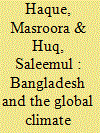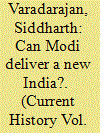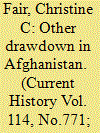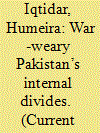|
|
|
Sort Order |
|
|
|
Items / Page
|
|
|
|
|
|
|
| Srl | Item |
| 1 |
ID:
138176


|
|
|
|
|
| Summary/Abstract |
The yearly international climate change negotiations, also known as Conferences of Parties (COPs), are large and formidable affairs. Under the aegis of the United Nations Framework Convention on Climate Change (UNFCCC), government ministers, bureaucrats, and other delegates from developed and developing countries come to hash out compromises. Civil society organizations, activists, researchers, scientists, UN officials, journalists, students, and private-sector leaders come from all over the world to protest, network, and exchange ideas.
|
|
|
|
|
|
|
|
|
|
|
|
|
|
|
|
| 2 |
ID:
138173


|
|
|
|
|
| Summary/Abstract |
On the surface, Narendra Modi has had a dream run in his first year as India’s prime minister. In May 2014, his Hinduright Bharatiya Janata Party (BJP) won 281 of the 543 seats in the Lok Sabha, the lower house of Parliament. This marked the first time since Rajiv Gandhi’s victory of 1984 that a party won a clear majority of its own and did not need coalition partners to form a government. After this triumph, Modi managed to install his trusted lieutenant, Amit Shah—who ran the interior ministry in Gujarat when Modi was chief minister of the state—as president of the BJP. Together with Shah, he has since gone on to win important state elections in Haryana, Maharashtra, and Jharkhand. In Jammu and Kashmir, the BJP did spectacularly well in the December 2014 elections and is now in government as part of the ruling coalition headed by the Peoples’ Democratic Party.
|
|
|
|
|
|
|
|
|
|
|
|
|
|
|
|
| 3 |
ID:
138178


|
|
|
|
|
| Summary/Abstract |
The unexpected ouster of an authoritarian president in January’s election was the result of a slow-burning citizens’ uprising. Will this revival of civil society lead to lasting progress?
|
|
|
|
|
|
|
|
|
|
|
|
|
|
|
|
| 4 |
ID:
138175


|
|
|
|
|
| Summary/Abstract |
On December 28, 2014, the combat mission of the NATO International Security Assistance Force (ISAF) in Afghanistan ended after 13 years. The transition to Afghan responsibility for security was heralded by ritually retiring ISAF’s green flag during a secret ceremony conducted in a basketball gymnasium inside the mission’s Kabul headquarters. During the event, the American ISAF commander, Gen. John F. Campbell, declared, “Our commitment to Afghanistan endures. . . . We are not walking away.” The confidence of the commander was strangely disconnected from the reality of the insurgency raging outside. After all, the ceremony was held surreptitiously out of fear: The Taliban have long been able to conduct deadly attacks at will in the capital.
|
|
|
|
|
|
|
|
|
|
|
|
|
|
|
|
| 5 |
ID:
138177


|
|
|
|
|
| Summary/Abstract |
As we witness growing chauvinism and violence toward minorities in India and Pakistan alike, we must ask what price we are willing to pay for the homogenizing wrath of Partition’s nation-states.” Seventh in a series on resurgent nationalism around the world.
|
|
|
|
|
|
|
|
|
|
|
|
|
|
|
|
| 6 |
ID:
138174


|
|
|
|
|
| Summary/Abstract |
Pakistan has paid a very heavy price for a military ruler’s decision to support the US-led “war on terror” in the region. That decision, made by Gen. Pervez Musharraf more than 14 years ago, led to the expansion of militant groups in the country; the introduction of suicide bombings, which were unheard of before 2004; and a major economic downturn that brought high unemployment and inequality. Just before Musharraf came to power in 1999, only 17 percent of Pakistan’s population lived at or below the poverty line. By 2008, 37 percent had fallen into this category. These slow-motion ripple effects of the US-led war in Afghanistan were not unexpected, but most of them have been extremely painful for ordinary Pakistanis to live through.
|
|
|
|
|
|
|
|
|
|
|
|
|
|
|
|
|
|
|
|
|